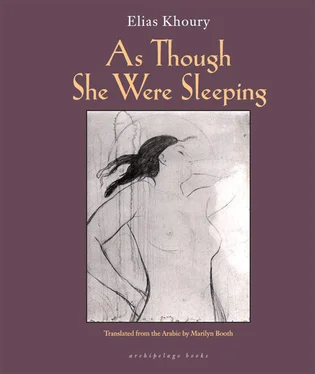Salma’s death did not come as a surprise. The young woman had contracted the yellow fever that prowled the streets of Beirut. Everyone knew that Salma would die. She had refused all offers of marriage as she waited for Ibrahim Hananiya, who had traveled to Brazil with a promise that he would return wealthy and marry her, and she was still waiting. Malakeh bought a white wedding gown so that her daughter could wear it into her coffin. Milia caught some fragments of the story from her mother, who contributed to the purchase of the gown. But matters became confused in the girl’s head. She heard her mother say that Salma’s wedding was near; and she saw the grandmother who came to visit them one morning weeping for her daughter’s lost youth. But she did not understand the meaning of any of it until she saw it in her dream. When her tongue formed the words to the story, which slipped through the gap made by the missing baby teeth, and she told her grandmother how she had seen what no one else had seen, she was afraid of her grandmother’s response. Don’t say such things, my dear, Grandmama warned. Only the dead see the sleep-visions of the dead. Her grandmother made the sign of the cross on her granddaughter’s brow and asked God’s protection for her. May the cross of the Greek Orthodox Church protect you, my girl.
In her dream she saw him, too.
Milia told her mother and her grandmother that she had seen Ibrahim Hananiya walking behind Salma’s coffin. She had seen a short, rather rolypoly man in a long green overcoat, his head drooping as if his short neck could not support it. He had been wearing brown and white shoes, she said, and he staggered and reeled as he walked, with no cane to support his body. Ibrahim was alone, Milia told them, and she had spoken to him. No, he was the one who spoke first. He came over to her and remarked that no one had recognized him. He had changed enormously in Brazil, he told her. Before, I wasn’t short like this, he said. But I put on weight and fat shortens a person. Maybe that’s why no one recognizes me. He smiled, showing his yellowish teeth, and asked her if she was Salma.
Salma is dead. Why are you bringing me into it?
I know, I know, he said. But you are Salma, aren’t you?
When she tried to answer him her tongue stuck in the baby-tooth gap. She sensed herself powerless to form any words; what came out of her mouth seemed nothing more than a few unintelligible gurgles, and she began to cry.
She wanted to ask him why he had not come back from Brazil before Salma’s death. She wanted to know if he had gotten rich like all Lebanese did when they immigrated to those faraway lands. She wanted to say that her aunt had died because of him. But she could not. She felt the words dissolve before they were even formed. She felt herself choking and she could not say a word.
Ibrahim’s image remained imprinted in her memory as though he had been her man, indeed her very first man. She sensed a lingering love for him. From the tears welling in his eyes, she knew somehow that he had lost everything by returning to Beirut only to discover that the woman for whose sake he had gone away, and then had come back, was dead.
That was what she would have told Mansour, had she told him anything. Mansour talked all the time. He left no spaces for the silent speech hidden in his wife’s pale features. And on those occasions when he did want to listen to her, Milia would find herself unable to speak. Crying in pain, she would call out to the mother who had not saved her from her interminable dream.
When she told her grandmother and her mother about her dream-meeting with Ibrahim Hanania, her mother hastily ordered her to stop. Enough talking, my dear! We’ve other things to do. We don’t have the time to always be listening to your dreams.
Ibrahim Hanania in Beirut? The bastard, he came here but didn’t stop by to see us? He waits until the girl is dead and then he shows himself? exclaimed the grandmother to her daughter, wiping away her tears.
What’s wrong with you, Mama? You don’t believe Milia’s dreams, now, do you? What are you talking about?
Yes, yes, so he’s gotten short and round and he can’t even talk, but why didn’t he come and see the girl before she died? It isn’t right! Grandmama went on.
What crazies there are in this family! was her mother’s only comment.
You’re the one who’s crazy. Milia saw the man and I saw him too.
What do you mean, Mama, you saw him? The fellow is in Brazil. His brother came here and told us that Ibrahim is very upset and sorry but he cannot come back to Lebanon.
No, no! He was here in Beirut, but he did not come to see the girl and it broke her heart. Mine, too.
Ibrahim told her he was afraid of death. And aren’t you, Salma? he asked her.
No, I’m Milia.
He said he had not dared to visit his fiancée on her deathbed. He began to cry.
Khallaas, ya binti , that’s enough, said Saadeh to her daughter.
Milia looked at her mother fearfully and closed her mouth. She went out to the garden, screwed the hose to the water spigot over the pond, turned on the water, and watered the greenery.
Musa was seven when, clutching his sister’s hand, he stood by his dead grandmother’s bed. The boy did not understand what death meant. He did not know what it meant for his grandmother to journey inside her dreams. He heard the keening of the women gathered around the bed of the chalkyfaced woman whose body was covered by white sheets, and his eyelashes filled with something like water although he did not cry out loud or even whimper. He stood waiting for his sister to brush her fingertips across his lashes and lean over to kiss him on the eyes. Whenever she sensed he was afraid, that was what Milia would do. Swabbing his lashes gently like this brought the little boy back to himself and took him out of his nighttime fears. Musa was afraid of the creatures of the night and the nighttime trees. Milia had told him that the trees of the night fill the sky after the sun goes down. Then the dreams come and build their nests on the branches of the night. So the boy was terrified of the night and its nests. When he woke up in the dark his bare feet brought him creeping into his sister’s bed. Milia would move slightly without opening her eyes and the boy would curl up against his sister. She would put out her hand and caress his eyelids with her fingertips and then she would give him a kiss on each eye. Only then would Musa fall into an uninterrupted sleep.
Musa was twenty years old when he came to tell his sister that Mansour Hourani wanted to marry her. The young man stood before his sister, who was perched on the edge of her bed, her head bent over a sock she was mending. Before he could say anything she noticed that his eyelashes were damp with tears. He spoke about Mansour and she said nothing. She put the stocking down on the bed, the wooden darning egg still stuffed inside. She stood up to face him. She put out her hand and ran her fingertips along his eyelids. She leaned toward him and kissed his eyes, sensing the taste of his tears. She saw him once again in his boyhood, his eyes alarmed and his lower lip trembling. As she kissed his eyes, she said she would agree to everything he wanted.
This is what you want, isn’t it? she asked him.
The little boy regained his height and returned to his manhood. He knitted his brows, looked full at his sister, and said, Yes.
As you wish, she said.
He did not ask her what her relationship was with this man. He did not say that Mansour had said, when he asked for her hand, that Milia had assented and had divulged her love. He felt betrayed but he did not use this word when he asked his sister how she felt about it.
Do you love him?
She gazed at him as if she did not understand what he meant. She smiled and said she had consented because Mansour reminded her of him.
Читать дальше












